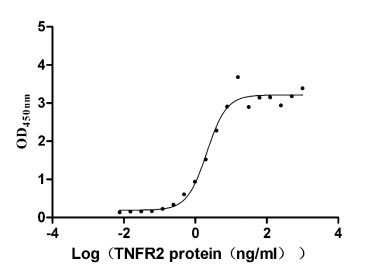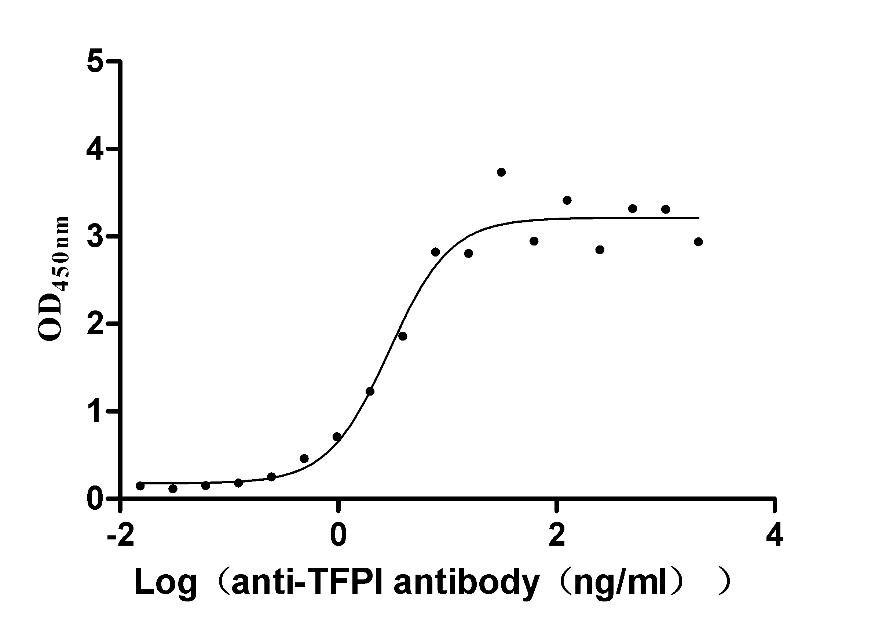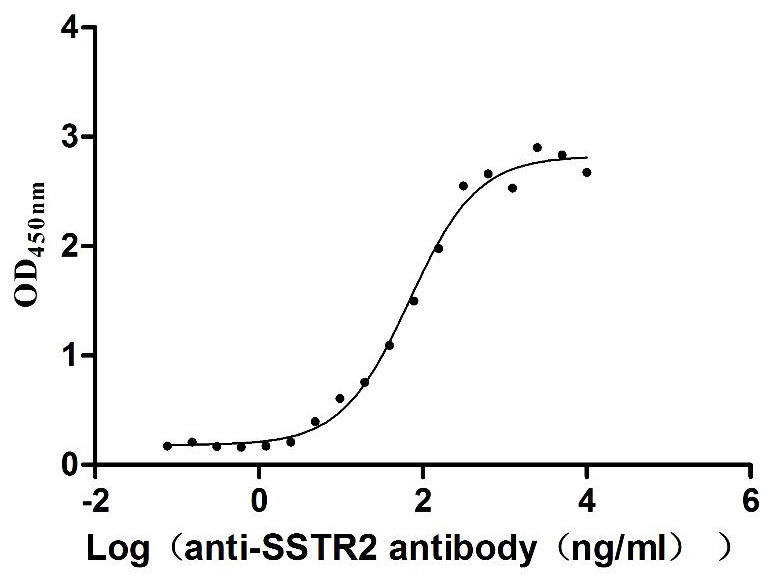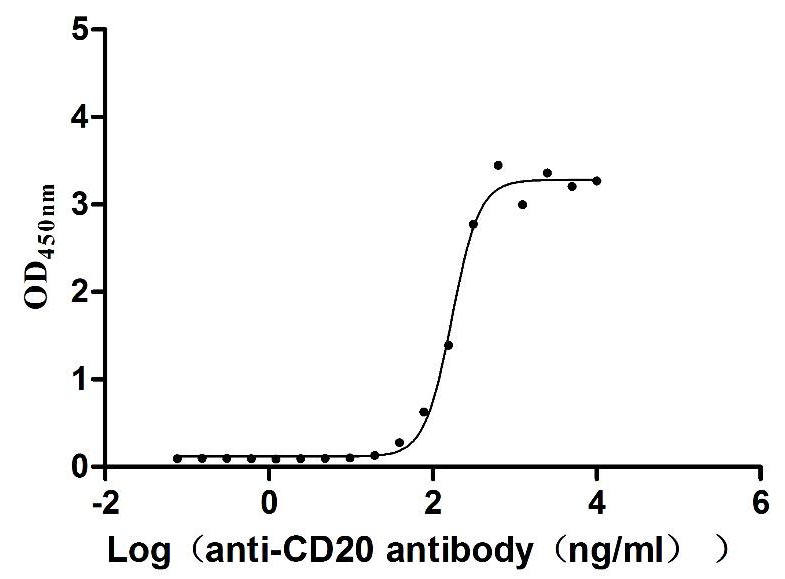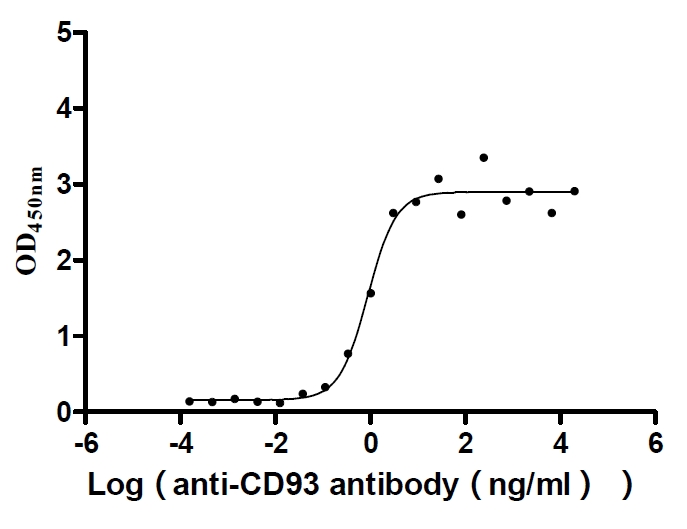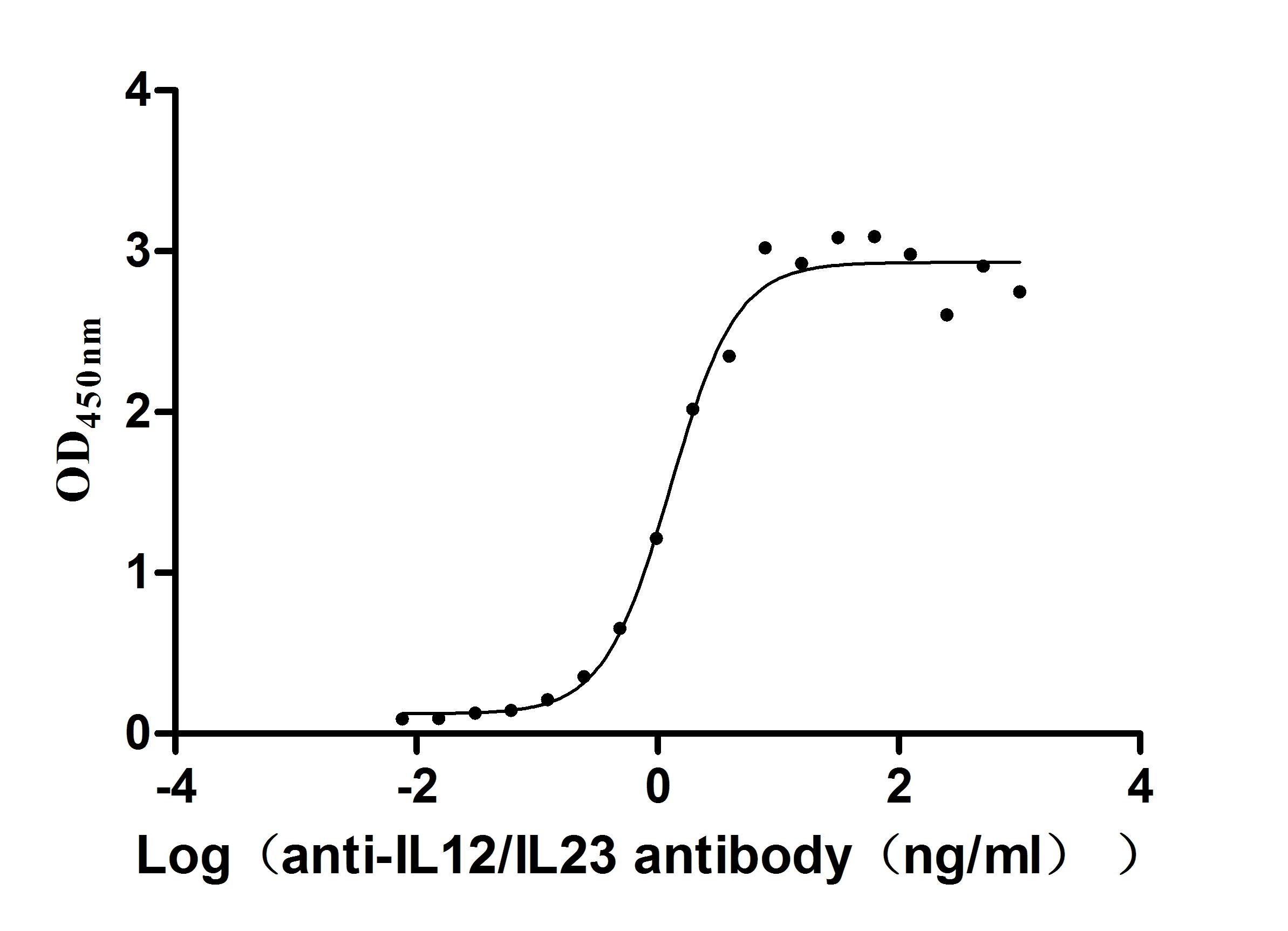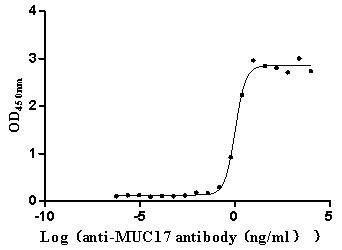Recombinant Human Melanoma-associated antigen 4 (MAGEA4)
-
货号:CSB-YP013330HU
-
规格:
-
来源:Yeast
-
其他:
-
货号:CSB-EP013330HU
-
规格:
-
来源:E.coli
-
其他:
-
货号:CSB-EP013330HU-B
-
规格:
-
来源:E.coli
-
共轭:Avi-tag Biotinylated
E. coli biotin ligase (BirA) is highly specific in covalently attaching biotin to the 15 amino acid AviTag peptide. This recombinant protein was biotinylated in vivo by AviTag-BirA technology, which method is BriA catalyzes amide linkage between the biotin and the specific lysine of the AviTag.
-
其他:
-
货号:CSB-BP013330HU
-
规格:
-
来源:Baculovirus
-
其他:
产品详情
-
纯度:>85% (SDS-PAGE)
-
基因名:
-
Uniprot No.:
-
别名:Cancer/testis antigen 1.4; CT1.4; MAGA4_HUMAN; MAGE 4; MAGE 4 antigen; MAGE 41; MAGE 41 antigen; MAGE 4A; MAGE 4B; MAGE X2; MAGE X2 antigen; MAGE-4 antigen; MAGE-41 antigen; MAGE-X2 antigen; MAGE4; MAGE41; MAGE4A; MAGE4B; MAGEA 4; MAGEA4; Melanoma antigen family A 4; Melanoma associated antigen 4; Melanoma-associated antigen 4; MGC21336
-
种属:Homo sapiens (Human)
-
蛋白长度:Full length protein
-
表达区域:1-317
-
氨基酸序列MSSEQKSQHC KPEEGVEAQE EALGLVGAQA PTTEEQEAAV SSSSPLVPGT LEEVPAAESA GPPQSPQGAS ALPTTISFTC WRQPNEGSSS QEEEGPSTSP DAESLFREAL SNKVDELAHF LLRKYRAKEL VTKAEMLERV IKNYKRCFPV IFGKASESLK MIFGIDVKEV DPASNTYTLV TCLGLSYDGL LGNNQIFPKT GLLIIVLGTI AMEGDSASEE EIWEELGVMG VYDGREHTVY GEPRKLLTQD WVQENYLEYR QVPGSNPARY EFLWGPRALA ETSYVKVLEH VVRVNARVRI AYPSLREAAL LEEEEGV
-
蛋白标签:Tag type will be determined during the manufacturing process.
The tag type will be determined during production process. If you have specified tag type, please tell us and we will develop the specified tag preferentially. -
产品提供形式:Lyophilized powder
Note: We will preferentially ship the format that we have in stock, however, if you have any special requirement for the format, please remark your requirement when placing the order, we will prepare according to your demand. -
复溶:We recommend that this vial be briefly centrifuged prior to opening to bring the contents to the bottom. Please reconstitute protein in deionized sterile water to a concentration of 0.1-1.0 mg/mL.We recommend to add 5-50% of glycerol (final concentration) and aliquot for long-term storage at -20℃/-80℃. Our default final concentration of glycerol is 50%. Customers could use it as reference.
-
储存条件:Store at -20°C/-80°C upon receipt, aliquoting is necessary for mutiple use. Avoid repeated freeze-thaw cycles.
-
保质期:The shelf life is related to many factors, storage state, buffer ingredients, storage temperature and the stability of the protein itself.
Generally, the shelf life of liquid form is 6 months at -20°C/-80°C. The shelf life of lyophilized form is 12 months at -20°C/-80°C. -
货期:Delivery time may differ from different purchasing way or location, please kindly consult your local distributors for specific delivery time.Note: All of our proteins are default shipped with normal blue ice packs, if you request to ship with dry ice, please communicate with us in advance and extra fees will be charged.
-
注意事项:Repeated freezing and thawing is not recommended. Store working aliquots at 4°C for up to one week.
-
Datasheet :Please contact us to get it.
相关产品
靶点详情
-
功能:Regulates cell proliferation through the inhibition of cell cycle arrest at the G1 phase. Also negatively regulates p53-mediated apoptosis.
-
基因功能参考文献:
- MAGEA4 was positively correlated with TWIST1, and its knockdown inhibited EMT in TE3 cells. PMID: 28653599
- Because of the significant correlation of MAGEA4 and indices of poor prognosis, the role of this CTA may be confirmed in Esophageal squamous cell carcinoma (ESCC) aggressiveness and metastasis. Therefore, MAGEA4 may be a promising therapeutic candidate for suppressing ESCC aggressiveness PMID: 30197348
- Study shows that whereas MAGEA4 expression by itself may be indicative of a poor prognosis in primary lung cancer, its prognostic value depends entirely on its subcellular localization and on the p53 status. The accumulation of nuclear MAGEA4 expression without p53 expression is significantly associated with poor survival, implying that MAGEA4 inhibits apoptosis and increases tumorigenesis. PMID: 29901069
- MAGE-A4 depletion from MAGE-A4-expressing cancer cells destabilizes RAD18. PMID: 27377895
- Our results support...the potential utility of MAGEA4 as an ancillary diagnostic marker for synovial sarcoma PMID: 28744588
- some autoantibodies, such as anti-MAGEA4, anti-CTAG1 or anti-TP53 and their combinations could possibly contribute to the development of cancer early detection tests (not necessarily restricted to gastric cancer) when being combined with other markers. PMID: 27140836
- Anti-MAGEA4 exhibited the highest sensitivity for detecting early stage colorectal cancer (CRC) and advanced adenoma. PMID: 26909861
- High MAGE-A4 expression is associated with Lung Cancer. PMID: 27793776
- Results found concomitant overexpression of MAGEA4 and TWIST1 in esophageal squamous cell carcinoma (ESCC). Also, it showed a correlation between MAGEA4 and TWIST1 expression, which was found as indirect binding of TWIST1 to the E-boxes in the MAGEA4 promoter revealing transcriptional upregulation of MAGEA4 by TWIST1. PMID: 27533647
- Results support the potential utility of NY-ESO-1, PRAME, and MAGEA4 as targets for immunotherapy and as ancillary prognostic parameters in synovial sarcomas. PMID: 27993576
- CTAs (MAGE-A4, NY-ESO-1, MAGE-A10) were more likely expressed in patients with squamous cell carcinoma of the lung and when CTAs combined with CD133, they can be better prognostic factors. PMID: 26191258
- HLA class I loss in smokers or patients with the MAGE-A4 gene was a prognostic factors in non-small cell lung cancer . PMID: 23124547
- Expression of MAGE-A4 may make immunotherapeutic intervention possible in selected patients with thyroid cancer. PMID: 24238058
- Detection of MAGE-4 transcripts in blood may help to predict the prognosis and monitoring of the response of HCV-infected hepatocellular carcinoma patients to therapy PMID: 22653756
- Mage-A4 expression and serum identification is and potential therapeutic target in estrogen receptor negative breast cancer. PMID: 23172894
- MAGEA4 promotes growth by preventing cell cycle arrest and by inhibiting apoptosis mediated by the p53 transcriptional targets. PMID: 22842486
- High MAGE-4 gene expression is associated with metastases in hepatitis C virus patients complicated by hepatocellular carcinoma. PMID: 21452042
- MAGE-A4 is identified as a specific biomarker of esophageal squamous cell carcinoma with a possible oncogenic role contributing to tumor progression. PMID: 21613820
- novel HLA-A2-restricted T cell epitope derived from MAGE-4 was identified PMID: 21815906
- High MAGE-A4 gene expression is associated with head and neck squamous cell carcinoma PMID: 20715104
- Report immunohistochemical expression of MAGE-A4 in renal oncocytoma and chromophobe renal cell carcinoma. PMID: 20591578
- positive expression in patients with non-small cell lung cancer is associated with poorer overall survival PMID: 19545928
- MAGE-4 protein may have a role in development of hepatocellular carcinogenesis in cirrhotic patients PMID: 11985796
- MAGE-A4 expression in bladder transitional cell carcinoma. PMID: 12209610
- strong MAGE-A4 expression and to a lesser degree NY-ESO-1 expression is characteristic of the vast majority of uterine carcinosarcomas and a major subset of papillary serous carcinomas PMID: 12209997
- MAGE-A4 binds to gankyrin and suppresses its oncogenic activity. PMID: 12525503
- a cleaved form of MAGE-A4 binds to Miz-1 and induces apoptosis PMID: 14739298
- MAGE-A4(143-151) and SAGE(715-723) are HLA-A2402-restricted CTL epitopes PMID: 16061876
- Expression may represent potential targets for cancer immunotherapy in patients with non small cell lung carcinoma. PMID: 16596224
- Expressed in a large part of epithelial skin tumors with predominantly scattered immunoexpression pattern in organ-transplant recipients. PMID: 17214847
- Its expression is significantly associated with prognostic factors in poor outcome of the non-small cell lung cancer. PMID: 18982744
- Overexpression of MAGE-A4 is associated with bladder cancer. PMID: 19533752
显示更多
收起更多
-
组织特异性:Expressed in many tumors of several types, such as melanoma, head and neck squamous cell carcinoma, lung carcinoma and breast carcinoma, but not in normal tissues except for testes and placenta.
-
数据库链接:
HGNC: 6802
OMIM: 300175
KEGG: hsa:4103
STRING: 9606.ENSP00000276344
UniGene: Hs.37107
Most popular with customers
-
Recombinant Human Lymphotoxin-alpha (LTA) (Active)
Express system: Mammalian cell
Species: Homo sapiens (Human)
-
Recombinant Rabbit Tissue factor pathway inhibitor (TFPI) (Active)
Express system: Mammalian cell
Species: Oryctolagus cuniculus (Rabbit)
-
Recombinant Human Somatostatin receptor type 2 (SSTR2)-VLPs (Active)
Express system: Mammalian cell
Species: Homo sapiens (Human)
-
Recombinant Human Zymogen granule protein 16 homolog B (ZG16B) (Active)
Express system: Mammalian cell
Species: Homo sapiens (Human)
-
Recombinant Dog B-lymphocyte antigen CD20 (MS4A1)-VLPs (Active)
Express system: Mammalian cell
Species: Canis lupus familiaris (Dog) (Canis familiaris)
-
Recombinant Human Complement component C1q receptor (CD93), partial (Active)
Express system: Mammalian cell
Species: Homo sapiens (Human)
-
Recombinant Human IL12B&IL12A Heterodimer Protein (Active)
Express system: Mammalian cell
Species: Homo sapiens (Human)
-
Recombinant Human Mucin-17 (MUC17), partial (Active)
Express system: Mammalian cell
Species: Homo sapiens (Human)


